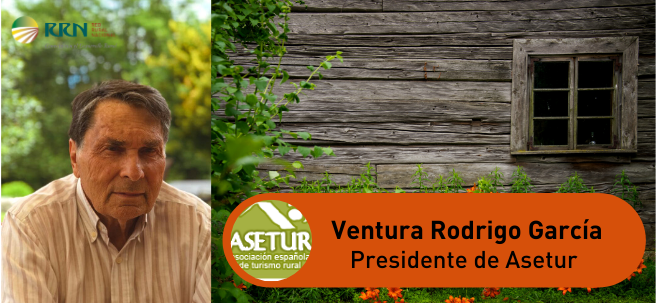
19 de June de 2020
June 19, 2020. The approaching summer season is marked by the easing of restrictions toward a "new normal" following the post-lockdown period caused by the COVID-19 pandemic. In this context, and due to international travel restrictions, domestic tourism appears, at first glance, to be the most likely option for citizens.
- Ventura Rodrigo García Fabián, president of the Spanish Rural Tourism Association ASETUR, gives an interview to the National Rural Network .
 |
Ventura Rodrigo García Fabián, president of the Spanish Rural Tourism Association (ASETUR ), speaks with the National Rural Network just days before the start of the holidays. And, although there is no concrete data yet, he already has all the clues that paint a picture of the type of rural tourism Spaniards are looking for for summer 2020:
RRN: Ventura, does Asetur already have data on reservations made at rural establishments for this summer?
Ventura: Without any data in hand, we can confirm an increase in requests in the rural sector compared to other years. And based on the reservations made, we see that there are first-time guests who hadn't previously used our accommodations. This sets a clear goal for our sector: it gives us the opportunity to inspire new guests so we can build long-term loyalty and ensure it doesn't remain a temporary issue. That's why I urge the rural tourism industry to be more careful and demanding than ever, so that local guests return many more times, happy and satisfied.
RRN: Based on the type of reservations made, what is the trend?
V: So far, reservations have been made for July and August, especially August. In June, there are hardly any reservations. And these have been made both by individual users and through operators. But it's clear that there is a prevalence of entire house rentals for entire families , and fewer reservations for shared rooms in hostels or hotels. At least for now.
RRN: What health and safety measures does the sector plan to take?
V: Basically, those imposed at the state level: social distancing and cleaning. However, in our case, we will also impose complete and absolute disinfection between exits and new entrances. Of course, we appeal to the responsibility of guests to ensure that coexistence in the facilities is as respectful as possible. We must not forget that the population surrounding rural establishments is predominantly older, and we must be more careful with them than with anyone else.
RRN: What is unique or different about rural accommodation compared to other types of tourist accommodations?
V: I always say that rural accommodation isn't just accommodation: it's landscapes, customs, people, traditions... Rural enclaves are living spaces where experiences are shared. That's why we should all take care of them together.











